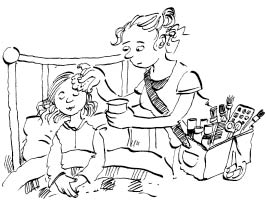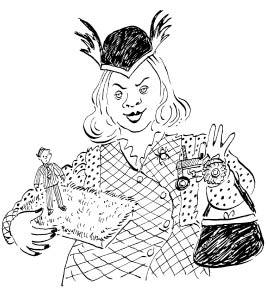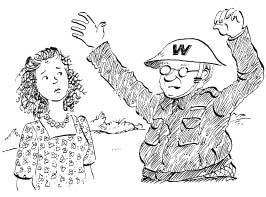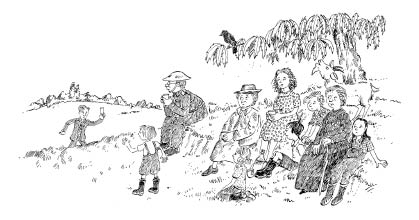Nanny McPhee Returns (12 page)
Read Nanny McPhee Returns Online
Authors: Emma Thompson

This time, Megsie heard something in Celia’s voice that meant she really
could
keep them and that Celia wasn’t just saying it. She thought for a moment and then stood up and opened the little chest that she kept her best things in. She got out her new corduroy trousers, a present from her parents last Christmas, and her Sunday shirt, which had embroidery on the collar. She went back and placed them next to Celia.
‘These are my best,’ she said. ‘But you’re used to smart things so you can have them for every day.’
Celia looked at her. They gave each other a small smile.
Meanwhile, the person feeling the saddest of all about the piglets was marching into the village with a face like thunder. Phil was furious. Curse those children! They’d undone his plan and rendered his night’s digging useless! He was getting more and more frightened about Miss Topsey and Miss Turvey coming back and carrying out their threat. Removing his kidneys! But he needed them! They processed waste products out of his body and were vital to sustain life!! He gulped as he walked and gnashed his teeth when he thought of how close he’d been to persuading Isabel to sign. He felt as though he were living in one of those nightmares that you can’t wake yourself from.
Just as he passed the alley where he’d first met the ladies, he heard a little ‘oo-oo’ noise, like a cuckoo. He froze. He looked to the right and to the left. Nothing. He looked in front and behind. Again, nothing. Then he heard the noise again, above him. He looked up, half expecting to see Miss Topsey and Miss Turvey hanging from the tree branches like a couple of gigantic, blood-sucking bats. But there, in the tree, was a lovely little bird, its head cocked to one side as it sang ‘oo-oo’ sweetly at him. Phil gave a sob of relief and turned back, walking straight into the majestic bosom of Miss Turvey.
‘Hello, Phil,’ she said. ‘Have you missed me?’
We’ve been shooting in the bedroom today. It’s upstairs. It is therefore higher up than the kitchen set and, as you all know, heat rises. It is sunny. All the lamps are on. It is 44°C up there. The crew are all pink and panting, and the children, who are in pyjamas and under bedclothes have to be sponged down at regular intervals. I am in full costume so I won’t even tell you what it’s like in there, except to say that it smells like something died.

I discovered that one of our excellent Runners (see Glossary), whom I have been calling Lauren for the past few weeks, is in fact called Laura.
‘Why didn’t you tell me?’ I shriek, aghast.
‘Because it doesn’t matter and you’ve got far too much else to remember,’ she replied smartly and without fuss. You see why one loves a crew. They work until they drop and then they say things like that. Amazing.
Later: We’ve finished in the bedroom and have moved on to another stage to do a bit of ‘green screen’. This is where you have to shoot something in front of a lot of green and then stuff is laid into the background by the FX team. In this instance, it is the fabulous Rolls-Royce (which costs £1,000 per day!) and Celia and Cyril doing a vomming scene, which they perform to comic and emotional perfection every time. They really are extraordinary, the pair of them. We’re packing up here at Shepperton because the next bit of the shoot is happening outside again, on a whole new location. It renders the place a bit like old digs at the end of a theatre job – full of boxes and cases (mostly my noses) and all the comforts of life packed away. Bit depressing, really, but we get a week off and then we go outside, which could be uplifting, depending on the weather. You can’t win. As soon as you go inside the studio, it gets hot and lovely outside. As soon as you leave studio, it starts to rain. It’s just what happens. Every. Single. Time. Ask Lindsay.
The Titans have packed up and left too, which is very sad. No more gold and silver Tupperware . . .
Phil gaped at Miss Turvey in complete horror as Miss Topsey appeared from behind her and gave one of her silvery laughs.
‘Oh, Phil, we are sorry, we didn’t mean to frighten you!’ she trilled.
‘I’m getting it! I’m getting the farm for you, I just need a signature, ladies, please understand that I’m getting it and I
will
get it and then
you
will get it, please – there’s no need for –’
‘For what, Phil?’ asked Miss Topsey, looking genuinely mystified.
‘For what you said – my kidneys –’
‘Oh that!’ said Miss Topsey, waving her hand as if to dismiss the whole kidney affair altogether.
‘Oh, don’t worry about that, Phil, we’re not going to take your kidneys off you! For heaven’s sake! Who do you think we are?’
Phil sagged against Miss Turvey’s bosom with relief. She lifted him away and propped him against the tree. Then she leaned in and said, ‘We’ve come up with a much better idea, Phil.’
‘Much better!’ agreed Miss Topsey, clapping her hands with delight.
‘Hold this, Phil,’ said Miss Turvey, opening her vast handbag and handing him a flat thing about the size of a chessboard covered with pretend grass. Phil held it, his heart beating double time and his knees shaking uncontrollably. Next, Miss Turvey took out a little figure in a blue suit – it had Phil’s hair and Phil’s shoes and Phil’s tie, all tiny and very accurately drawn.
‘Look!’ said Miss Topsey. ‘It’s you! Do you see, Phil?’
Phil nodded uncertainly. What on earth were they doing?
‘And look! What’s this?’
She opened her bag and took out a toy tractor.
‘It’s a tractor,’ said Phil, staring at the little figure on the grassy board with increasing dread.
‘And now look – what’s happening? You’re going for a nice walk in the country!’
Miss Topsey walked the little figure along the grass and Miss Turvey moved the tractor towards it, making engine noises and smiling encouragingly at Phil.
‘Choof-choof-choof-choof, see? And see what happens!’

Miss Turvey rolled the toy tractor over the little figure as both the ladies made terrible cracking noises and its legs and arms and head came off. Phil watched. The ladies looked at him joyfully.
‘We’re going to squash you with farm machinery!’ they chorused.
Not knowing quite how, Phil staggered away down the lane, shouting, ‘Now there’s no need for that, there’s no need!’ as the ladies called out after him: ‘Better hurry, Phil! Before it’s too late!’
‘How will I know when it’s too late?’ shrieked Phil, from the safety of a ditch.
The two hit-women looked at each other and then back at Phil. ‘We’ll send a sign,’ they shouted, waving cheerily.
Chapter Quobbly. I realise that I’ve been rather lax about the whole chapter thing, so here’s one with an exciting new number to it. One might as well be creative, don’t you think?
Anyway, it’s the next day.
It was a beautiful morning and the children had managed to rub along with each other fairly well except for Cyril, who was still sulking. He wasn’t entirely sure why he was sulking, but no one had given him any real reason to leave off so he just carried on. This is the problem with sulking, I find. The difficulty is never in starting it but in stopping it, because I suddenly feel a bit daft, which makes me feel cross, which starts me off wanting to sulk all over again.
Mrs Green had made a big picnic as promised and had invited Mrs Docherty and Mr Spolding who was still carrying his pamphlette. There were sandwiches (bloater paste and egg-and-cress because bloater paste was cheap and they got eggs free from the chickens) and apples and one large bottle of ginger beer, which Vincent was so excited about that he hadn’t slept a wink all night.
The party set out in glorious sun and found a perfect spot – good slopes for rolling down, a nice flat bit for the blanket and some pasture for the goat, whom they’d brought along to eat any leftovers. Everyone had made an effort. Mrs Docherty had a felt flower in her hat, Mr Spolding had polished his buttons and tucked in his string vest, Mrs Green was wearing her best Sunday dress and Nanny McPhee was sporting a very impressive row of medals on her chest about which the children were very curious. Everyone but Cyril was in a good mood, and Nanny McPhee hadn’t even objected when the children had, rather timidly, asked if they might invite Mr Edelweiss. They were also curious about Mr Edelweiss and Nanny McPhee, but they didn’t speak jackdaw and Nanny McPhee simply wasn’t the sort of person you asked intimate questions. She just wasn’t.
But after everyone (except Cyril) had had a game of cricket and done lots of cartwheels and had a sandwich and an apple, Mr Edelweiss came quite close to Megsie and accepted a crumb out of her hand.
Nanny McPhee tutted and said, ‘Get away with you, Mr Edelweiss, you greedy bird.’
Megsie decided to risk it.
‘Why do you call him Mr Edelweiss, Nanny McPhee?’
Nanny McPhee looked at the children, who were sitting in a sort of circle before her (except Cyril, who was a metre to the left). ‘Well,’ she said, ‘the edelweiss, as you know, is a small white flower and he is a large black bird!’
I don’t know whether Nanny McPhee thought this was a good joke but the children certainly didn’t so they just kept on staring at her politely as if there was going to be more.
Nanny McPhee sniffed.‘It was funny at the time,’ she said apologetically. At that moment Mr Edelweiss let out a very loud burp which all the children (except Cyril) thought
was
funny.
‘Don’t be so disgusting,’ said Nanny McPhee sternly.
‘What’s he done to make you so cross with him?’ asked Norman.
Everyone sat up and paid special attention now. Mr Edelweiss burped again but tried to cover it with a cough.
‘He eats inappropriate substances. Such as window putty.’
Here, Mr Edelweiss uttered a single guilty and slightly burpy squawk and took a step away from the group.
‘Such as . . .’ continued Nanny McPhee, fixing Mr Edelweiss with one of her beadiest looks, ‘such as all the window putty off every single one of my window panes, which all fell out when the bishop came to tea!’
‘That’s really bad,’ muttered Megsie.
Everyone looked at Mr Edelweiss now. He hopped off yet further, squawking and burping in a depressed and almost whiny way.
‘What’s he saying?’ asked Celia.
‘You really don’t want to know,’ said Nanny McPhee, sighing heavily.
Anxious to change a subject so clearly painful to the parties involved, Celia decided to pay Nanny McPhee a compliment.
‘You are looking well today, I must say, Nanny McPhee,’ she said.
‘Thank you, dearie,’ said Nanny McPhee with a little smile. The children noticed that she really was looking better – they couldn’t quite say how, but she certainly wasn’t quite so ugly any more. It was very odd.
‘I think it’s the country air,’ said Celia. ‘My skin’s better too.’
‘What are your medals for, Nanny McPhee?’ said Norman.
Nanny McPhee looked down at her chest and, pointing to each one in turn, said, ‘Courage. Kindness. Resolve. Imagination. Enthusiasm. Basketwork and Leaps of Faith.’
They all nodded, highly impressed.
At that moment, Mr Spolding made a huge exploding noise. Everyone looked over. He was pretending to be a bomb.

‘BOOFBANGBIFFBOOFBOOF!’ he shouted, going very pink in the face. ‘You see, Mrs Green? There’s a war on and that’s the sort of fatalistic explosion that could happen any second of the moment! That’s what you people don’t seem to understand! And that’s why I’m here – to protect you from yourselves!’
‘That’s enough now, Algernon,’ said Mrs Docherty, who understood Mr Spolding very well.
‘So,’ said Mr Spolding, taking no notice of anyone at all, ‘if a bomb drops, let me know as soon as possible!’
‘You’ll probably notice all by yourself, Mr Spolding,’ said Mrs Green kindly. ‘Anyway, guess what! It’s time for ginger beer!’
Vincent let out a huge whoop, which was echoed by all the other children (except Cyril) as they ran up to Mrs Green and queued with their tumblers for the precious treat. Vincent got his first and went and sat on the very far edge of the blanket so that no one could jog him or ask him for a sip because they’d gulped theirs down too quickly. You remember what I told you about Vincent and his chocolate bars and how long he could make them last. Well, he planned to make this little glass of ginger beer last right up until bedtime. He watched it for a bit and smelt it and then looked up and far away so that he could forget about it and then get a lovely surprise. While he was busy forgetting, he caught sight of a familiar blue suit walking along the edge of the field.
‘Here’s Uncle Phil!’ he cried. ‘Quick! Finish the buns!’
It wasn’t that Vincent was being mean or even that he didn’t like his uncle. He did. It was just that everyone was used to the fact that you could rely on Uncle Phil to turn up just when a cake was being taken out of the oven or when a bottle of something nice was being opened.
Mrs Green shielded her eyes against the sun and said, ‘He’s never normally late when there are treats. Here he is though – with his bloomin’ contract.’ But she said the bit about the contract under her breath.
But as Phil got closer it became clear that it wasn’t the contract he was carrying, it was something much smaller. Mrs Green narrowed her eyes, ‘Ooh!’ she said excitedly. ‘It’s not the contract, it’s too small – it must be a letter!’
Vincent jumped up, taking great care not to spill his ginger beer.
Now everyone gathered to watch Phil approaching. Mr Spolding leaned over to Mrs Docherty and said, ‘A letter from Rory – won’t that be nice, after all their waiting?’
But Mrs Docherty was gazing anxiously into his eyes. ‘Didn’t you see, Algernon? It’s yellow,’ she whispered. ‘That’s not a letter. That’s a telegram.’
Mr Spolding went white. He took Mrs Docherty’s hand and together they watched as Phil came up to Mrs Green and the waiting children.

I can’t be sure quite when Mrs Green and the children realised that the thing Phil was holding was yellow. It was one of those moments when something you don’t want to happen happens and everything slows down. To Vincent, and Megsie, and Norman, it certainly seemed to take Phil a long, long time to reach them. When he did, finally, Vincent just said, very quietly, ‘That’s not for us, is it?’